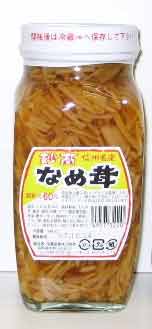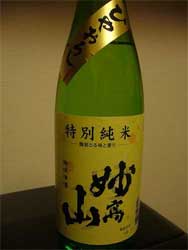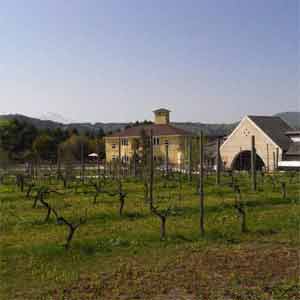Myoko-Nagano Shopping and Souvenir Guide
 Myokokogen
Myokokogen
Local shops:
There are many gift shops opposite the station in Myokokogen and scattered throughout the town where one can find all kinds of unique local products such assasazushi (sushi on bamboo leaves), takenoko jiru (bamboo shoots and miso soup), Myoko nametake (pictured right), plus the sake (rice wine) and koshihikari rice that Niigata is famous for.
Purchase Myoko sake online here (Japanese required)
Local produce:
Tomato, a popular vegetable and produce market, is open on Route 18 in Sekiyama nearly every day. The adjoining restaurant is also busy most days with tourists, locals and passerbys.
There are several blueberry farms in the area where you can pick your own blueberries (500-700 yen). The most easily accessible is right behind Panorama Park adjacent to the Myokokogen Station.
Arai
Open Market “Rokusai-ichi” 六斎市 : On the 6th and 10th of every month local farmers gather in Arai to sell fresh vegetables, fruits, fish, wild plants, flowers and much more. It’s a great place to have meet and chat with local people. This open market is located near the Ichi Shrine, where the God of Success, Business and Happiness is enshrined.

Michi no eki 道の駅 : There is a very nice gift shop here where you can get lovely presents – from straw animals (the typical omiyage of Arai made by the elderly during winter), sweets, sake (local ‘Ayumasamune’ sake is regarded as one of the best in the Japan) andkanzuri spice (pictured right – (a special seasoning from Myoko made by leaving chili pepper exposed on snow, then adding flour, salt andyuzu), as well as souvenirs like mobile phone straps, postcards, etc.
Buy Kanzuri Spice online for 630 yen (US$6.50) – Japanese required
Lake Nojiri
Local produce:
The Nojiriko area has numerous roadside stalls and farmers’ markets where you can buy great local produce for a quarter of the price you would pay in Tokyo. The tomatoes and peaches are renowned and the region grows blueberries, apples, pears, corn, edamame (green soybeans) and dozens of other fruits and vegetables, as well as all sorts of local specialties such as Scotch thistle preserve, walnut jam and aloe vera honey.
Iiyama
Local Products:
There are a number of unique products available. Iiyama’s Buddhist altars are famous for their craftsmanship and for the amount produced in one city. The local art of making Japanese washi paper, known as uchiyama tesuki washi, has a history of over four hundred years.
Tomikura soba (tomikura buckwheat noodles) can be found in Iiyama. The secret to the local tomikura soba is usage of wild burdock leaves, giving it a unique firmness plus a rich, dark flavor and color. Adventurous visitors MIGHT be able to find the soba restaurants which are unmarked with no signs or advertisements – local establishments are usually well-known among soba fanatics. But you’ll likely need to make a reservation because the noodles are handmade each day and they boil them as they are ordered.
Joetsu City (Takada, Naoetsu & Surrounds)
Wing Market: If you want a whole day of shopping therapy try the famous Jusco / Wing Market shopping area in Joetsu City. Catch the train to Naoetsu or Takada and then hop on a Number 6 bus from the station. Buses leave every hour or two. Alternatively it is 20-30 minutes walk across the bridge from Kasugayama station. See a Joetsu google map here.
Local Food: Koshihikari rice from the Kubiki area and local vegetables are used to make Kubiki oshi-sushi – a preservative free pressed sushi. Enjoy the three flavors of mysid shrimp with miso flavored pickle, egg with Japanese basil, and five-variety vegetable.
 Sake
Sake
The Rice and Sake Warehouse of Wonder:
Apart from the cool name this institution provides an introduction to all things about Niigata’s famous rice and sake. Here one can learn about sake brewing – panels, replicas and authentic items show the culture and history of sake from its beginnings, plus the way rice became what it is today and how it is made into sake is explained in a manner easily understood by visitors. Naturally there is also an opportunity to sample some examples of sake from all over the prefecture. Located at 867-1 Sanwa-ku in Joetsu City (Closed Mondays and during Winter). Phone: 025-532-4189 Admission: 300 yen. The Japanese name is kometo sake no nazo kura.
Purchase Myokokogen sake online here (Japanese required)
Wine Tasting
In 1898 wine was produced for the first time in Japan at lwanohara Vineyard 岩の原葡萄園 (in nearby Joetsu) by Kawakami Zenbe’e (1868-1944). Kawakami is recognized as the founder of grape growing and wine making in Japan. After a number of failures Emperor Meiji gave Kawakami’s first vintage the brand name of “Kikusui”. Throughout the year, you can visit the vineyard (opening hours: 9am-4pm. Open every day from April to October, ring ahead to confirm during winter) to taste wine, attend a barbecue and see the old cellar and barrels used by Kawakami Zembe’e, as well as the modern wine-making facilities. A museum dedicated to Kawakami is open every day (10am-4pm) except for Monday.
Address: 1223 Kitagata, Joetsu City (〒943-0412)
Phone: 0255-28-4002 Fax: 0255-28-3530
 |
|---|
St. Cousair Winery near Mure in Nagano (pictured right) is a gourmet restaurant, shop and winery. The gift shop contains, in addition to St. Cousair’s wines – which tend towards the sweet dessert types – an intriguing and extensive selection of new jams made from local produce, which can be sampled to your heart’s content. In addition to peach, strawberry and blueberry, there is a wonderfully delicious black sesame jam. The restaurant, which has a magnificent view, serves “French country cuisine’. If you feel the urge to get married there is also a chapel that was recently constructed with Mt. Myoko in the background. It is a ten minute taxi ride from JR Mure station and is open every day 9am-5pm Tel: Winery 026-253-7002. Restaurant 026-253-8070.
Buy wines and other St. Cousair products online (Japanese required)
Several wineries, wine cellars and other alcohol-related facilities dot the area along Prefectural Road 30 due to the water and climate that are suitable for brewing and distilling. The road is therefore called the Echigo Bacchus Highway. The Japanese name is bakkasukaido.
Local Breweries
Check out the Shinano Brewery in Kurohime. Reviews here and here. This brewery is nestled in the gentle rolling hills of Kurohime Heights. The brew master apprenticed at Ipswich Ale, near Boston. The result is four distinctive craft-brewed beers in bottles attractive enough to convert into vases or candle holders. Tel: 026-255-6633 Open: 11am-5pm daily
The Myoko Kogen Beer Hall (Alpenblick Tatra) in Ikenotaira near the Hotel Alpenblick is absolutely gargantuan. It seats 400 and aims for the feel of a Swiss ski lodge, replete with international flags and “Swiss feel” beer steins on sale. The house’s three brews come in cheery, plump, wine jug-shaped bottles. Their special brews are Weizen, Dark Lager and Pilsner. It is only a five minute walk from Ebisuya-mae bus stop on Ikenotaira Onsen bus route from JR Myoko Kogen station but a taxi from the station is recommended. It is open 11am-3pm, 5-9pm Mon-Fri, 11am-9pm, Sat, Sun and national holidays Tel: 0255-86-2600 Fax: 0255-86-5458. For more information on Myokokogen Beer see here
Myoko-kogen beers can also be obtained at Narus Sekiyama (3008 Sekiyama, Myoko-mura tel: 0255-82-2700) and from the liquor shop in the basement of Daiwa department store (4-4-8 Honcho, Joetsu-shi tel: 0255-26-4802).



